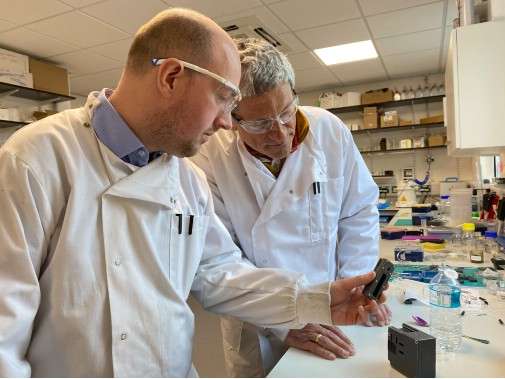Researchers Making Breakthrough with Ultra-Sensitive Blood Test, Paving the Way for Revolutionizing Alzheimer’s Diagnosis
The technology for the sensor, which works by detecting levels of proteins associated with Alzheimer’s in the blood, has already been patented by University spin-out company Phorest Diagnostics.
The research team are now working to incorporate the technology into a handheld device, which could diagnose patients within seconds via a simple finger-prick test.
Cheaper, as accurate and less invasive than brain scans or lumbar punctures, the researchers say the device they are developing could revolutionise the diagnosis of Alzheimer’s. It is possible that it could also allow for the disease to be diagnosed 15-20 years before the onset of symptoms.
Potential
Dr Steven Quinn from the University’s School of Physics, Engineering and Technology is working on the project, which is funded by Alzheimer’s Society and Alzheimer’s Research UK, in partnership with Professor Thomas Krauss.
Dr Quinn said: “While our project is still in the early stages, our light-based technology has the potential to be used for rapid diagnosis of Alzheimer’s without the need for invasive and costly hospital procedures. It could also be used to improve monitoring of patients already receiving treatment for the disease, as it will be sensitive enough to identify changes in the levels of the specific proteins that serve as indicators of Alzheimer’s in the bloodstream.”
Toxic proteins
The technology detects amyloid and tau proteins, which are biomarkers for changes in the brain associated with Alzheimer’s disease. It works by shining light beams on the surface of a sensor that is covered with chemicals . These chemicals act as a net to catch proteins present in the blood. The device then measures changes in the properties of light which indicate when toxic proteins are present.
Dr Quinn added “The concentration of these proteins in the blood of people with Alzheimer’s is very low, so you need something ultra sensitive to be able to detect them. The sensor allows for detection of multiple proteins and can look at their overall abundance in the blood as well as the ratios between them.”
Rapidly growing threat
Alzheimer’s is the most common cause of dementia and the number of people living with the disease globally is forecast to nearly triple to 153 million by 2050, presenting a rapidly growing threat to future health and social care systems.
“With potentially game-changing new Alzheimer’s treatments on the horizon, there is hope that the disease could become a manageable condition” Dr Quinn said. “Our vision is that this blood test will make obtaining a diagnosis much more accessible, as it is being designed to be user-friendly for clinicians. Its implementation could also be feasible at a comparable cost to that of a Covid test.
“While there is still a long way to go in developing this device and testing its effectiveness, blood test technology will play an important role in early detection and monitoring of a disease which affects millions around the world.”
Missing out
Dr Richard Oakley, Associate Director for Research and Innovation at Alzheimer’s Society, said: “Dementia is the UK’s biggest killer, but a third of people living with the condition don’t have a diagnosis. This means they are missing out on being able to access much-needed care and support, as well as potential new treatments coming down the line.
“We urgently need to fix dementia diagnosis and this innovative research, funded by Alzheimer’s Society, could help to bring us closer to a future of accessible tools for early and accurate dementia diagnosis.
“Along with supporting exciting projects like this one, we’re working with Alzheimer’s Research UK on the Blood Biomarker Challenge, which will revolutionise the way dementia is diagnosed. The project is possible thanks to £5m in funding raised by players of People’s Postcode Lottery and will gather the information needed to introduce a blood test for dementia into UK healthcare systems.”
Crucial
Sheona Scales, Director of Research at Alzheimer’s Research UK said, “Finding better ways to diagnose people who have symptoms of dementia is crucial, as only two out of three people in the UK with the condition ever receive a formal diagnosis. Diagnosing people earlier will be even more critical now that new treatments are emerging that are effective for people in the early stages of Alzheimer’s.
“We’ve seen some fantastic progress in the development of diagnostic blood tests for Alzheimer’s over the last few months. Although this study is at an early stage, it’s adding to a growing body of evidence that blood tests could be a more accurate and quicker way to diagnose people than using standard diagnostic tests.
“So far, no blood tests have been validated for use in the UK. But that’s set to change. In collaboration with our partners, Alzheimer’s Research UK is in the process of funding research that will provide the NHS with the evidence needed to move forward with blood tests to diagnose Alzheimer’s disease.”

